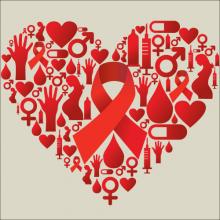PEPFAR

Representative Barbara Lee (D-Calif.) delivers remarks to a World AIDS Day event hosted by the Business Council for International Understanding in Washington, D.C, Dec. 2, 2022. In response to the 2023 threats to the program’s funding, Lee told Sojourners: “PEPFAR is the most successful foreign assistance program in history—failing to renew it would be devastating for millions ... We have a moral imperative to get this done and keep saving lives.” REUTERS/Jonathan Ernst
Over the past two decades, the United States has saved millions of lives by investing $110 billion in the U.S. President’s Emergency Plan for AIDS Relief, which aims to end the AIDS crisis by 2030. More than 25 million lives have been saved since PEPFAR launched in 2003, and 5.5 million babies who would have been born with HIV were born virus-free.
As is still the case today, bipartisan programs take effort — and bringing PEPFAR to life was no small feat. It required navigating a host of controversial issues such as the use of condoms and perceptions of the disease. It required enlisting the support of social conservatives. It required making an economic, a national security, and a humanitarian argument. It required raising awareness and galvanizing political will.
In an OpEd that appeared on POLITICO Monday, Mike Huckabee, the former Republican governor of Arkansas, and Blanche Lincoln, the former Democratic senator from Arkansas -- who together co-chair ONE Vote 2012, a non-partisan campaign to make global health and extreme poverty foreign policy priorities in the 2012 presidential election, wrote about the importance of maintaining U.S. foreign aid to the developing world that has helped make significant improvements in the health and sustainability of myriad nations, including many on the continent of Africa.
They wrote, in part:
It might come as a surprise to learn that less than one percent of the U.S. budget is spent on foreign assistance. It might even be shocking to discover that, despite this relatively small amount, these funds are literally saving millions of lives and improving the lives of many more millions of people.
For example, American investments in cost-effective vaccines will help save nearly 4 million children’s lives from preventable diseases such as pneumonia and diarrhea over the next five years. We’ve also helped to deliver 290 million mosquito nets to Malaria-stricken countries, and put 46 million children in school for the very first time. And thanks to the leadership of Presidents George W. Bush and Barack Obama, 8 million HIV/AIDS patients now have access to life-saving treatments, up from just 300,000 a decade ago, making an AIDS-free generation a real possibility within our lifetimes.
I wonder what would happen if the daily barrage of negative, misleading political campaign ads were replaced just for a day by a one-minute clip from the opening ceremony of the International AIDS Conference in Washington, D.C., last week.
This replacement ad would feature a beautiful, regal woman from Nigeria sharing a heartfelt and poignant ‘thank you’ to the American people for literally saving her life by providing access to antiretroviral drugs — medicine that creates a modern-day “Lazarus effect” in people whose immune systems have been ravaged by AIDS — and also ensures that her daughter was born HIV-free. I wish every member of Congress could have heard these words, a ‘thank you’ that echoes what many nations in sub-Saharan Africa are experiencing as they work to turn the tide of this deadly disease.
This one mother and child from Nigeria are only a snapshot of the millions of lives that have been transformed by American generosity and leadership through life-saving investments in the President's Emergency Plan For AIDS Relief (PEPFAR) and the Global Fund to Fight AIDS, TB and Malaria — which have increased the number of Africans on treatment from a shameful 50,000 in 2002 to more than 4 million today.
Former First Lady Laura Bush spoke with ABC News, expressing the importance of foreign aid and programs like the President's Emergency Plan for AIDS Relief (PEPFAR). In light of some in theTea Party calling to eliminate aid completely, the former First Lady said she thinks others don't realize how miniscule the amount actually is.
She said her husband President George W. Bush started the program because millions were dying in Africa from the epidemic.
"It would've been a crime I think to know that we had the capacity of helping people around the world live and not do anything about it.," Bush said.
I would never have been mistaken as a political supporter of President George W. Bush. But in his early days as president, I was invited to have conversations with him and his team about faith-based initiatives aimed at overcoming poverty, shoring up international aid and development for the most vulnerable, and supporting critical agendas such as international adoptions of marginalized children and the broken domestic foster care system.
My invitations to the Bush White House ended when I strongly and publicly opposed the Iraq War. But I continued to support the administration’s efforts to combat poverty and disease, especially Bush’s leadership in combating HIV/AIDs, malaria, and massive hunger in the poorest places in Africa.
That agenda was called “compassionate conservatism” and I was grateful for it. Back then, Republican leaders could be fiscally conservative, favor “small government,” and believe in the free market, for example, but also believe that government should and must partner with the private sector — especially non-profit and faith-based organizations — to help lift people out of poverty, both abroad in the developing world and here at home in the richest nation on the planet. Such a conviction requires two things: A genuine empathy and commitment to the poor, and a more balanced and positive view of government — neither of which were much evident in the GOP’s right-wing quarters, where the compassionate conservative agenda was opposed by party leaders such as Tom DeLay and Dick Armey.
I met people like Mike Gerson, who was then George Bush’s chief speech writer and a policy advisor, and is now a columnist for the Washington Post. I was told it was Gerson and the Bush himself who often were the ones to stand up for the compassionate conservative vision at Oval Office meetings.
Social justice is redundant.
Justice, properly understood in a biblical sense, always has social implications.
Personal salvation is redundant in the same way. Salvation, properly understood in a biblical sense, while it may have broader implications, is always personal in nature.
Why the modifiers?
HIV/AIDS is a justice issue. The most vulnerable and poorest people still don’t have access to the treatments that save lives. Jesus’ concern for the lives of the sick in Matthew 25 calls Christ-followers to do everything in our power to make these life-saving treatments available to every person in need.
“America is a great idea,” Bono said.
Fundamental to that idea is the belief that all people are created equal and endowed by their creator with the intrinsic right to life, liberty and the pursuit of happiness.
The right to life, the right to liberty, and the right to pursue happiness each demand the will and resources make an AIDS-free generation a reality by 2015.

By Reuvenk via Wikimedia Commons (www.gnu.org/copyleft/fdl.html)
The news is hopeful. We have seen both progress and proof:
- New data shows that an HIV-positive person on treatment is 96 percent less likely to pass HIV on to others.
- It only costs, on average, $335 for AIDS treatment through PEPFAR (down nearly 70 percent since 2004!).
- 22 countries in sub-Saharan Africa have reduced new HIV infections by 25 percent.
- Clinical trials show that voluntary male circumcision reduces the risk of new HIV infection in men by roughly 60 percent.
Yesterday was truly a momentous occasion. Looking at all the progress we have made, especially in the last 10 years, it is a moment for us to not only celebrate, but in the words of President Jakaya Kikwete of Tanzania, “recommit ourselves,” to end the fight against AIDS totally.
This week, the Senate will vote on H.R. 2354, an appropriation bill that will determine the amount of funds we allocate for poverty-related development assistance. There are a number of amendments proposed that will severely cut this aid, which currently helps millions of the world's poorest and most vulnerable. The bottom 1 percent, if you will.
Right now, in cities around the world, there is a growing protest movement putting the issue of economic inequality squarely on the public agenda. Regardless how you feel about this movement, I believe there is another "99 percent" we need the G20 – and urgently Congressional leaders – to remember and prioritize.
Nearly 8 million children under the age of five die every year due to preventable malnutrition and disease. But they are not dying in the United States, Germany or here in France.
According to research by World Vision’s Child Health Now campaign, 99 percent of those entirely preventable deaths take place in developing countries. The 99 percent of the children that die under the age of 5 are too often invisible and don't have a voice at major global summits such as the G20 or in the corridors of Congress. These children constitute the real and too often forgotten 99 percent.
People of faith -- including evangelical Christians -- will be voting both ways in the upcoming election. It is simply not true that they will be voting only on one or two issues.
And, if evangelicals focus on many of the issues central to their faith, rather than becoming partisan cheerleaders, they might be able to raise some critical issues in this election and to hold both sides more accountable, even in a campaign that both Richard and I suspect will be one of the ugliest in U.S. history.
At the end of the evening, Amy remarked that if the upcoming election debates were as civil and substantive as this evening was, we would all be very grateful.





